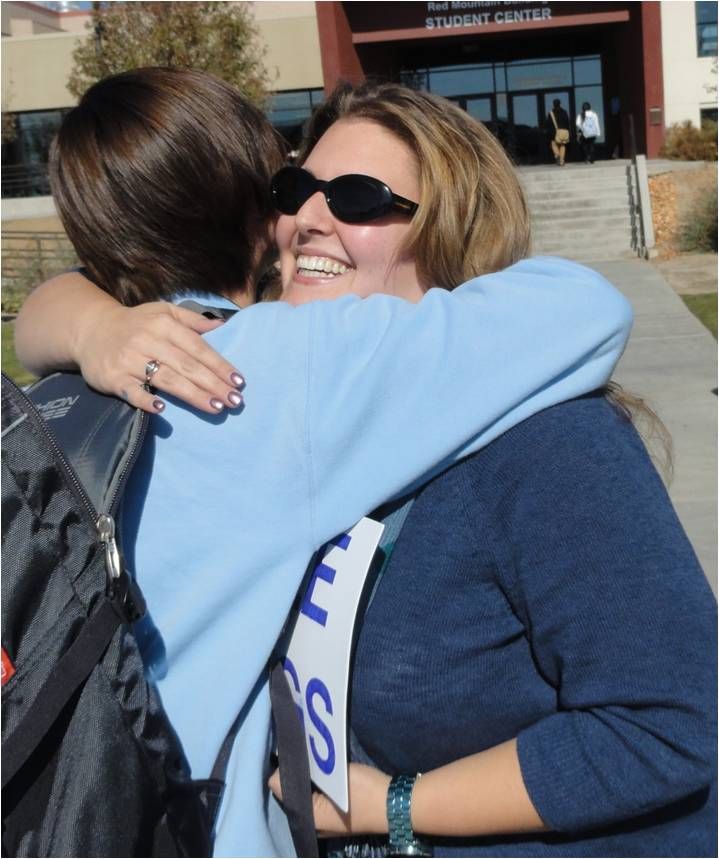What if a stranger offered you a free hug simply as a gesture of love, connection and comfort? What factors would impact your decision to accept or deny the embrace? Would it make a difference if the hug came from someone who looks like you instead of being a different race, age, weight, social class or culture? If so, why does it matter?
Students at the адАЎЮхЩЋЬь, Reno set out to personally experience this interaction through a Free Hugs activity that investigated the demographics and reactions of random strangers who accepted or denied a free hug. Students held a sign that stated "Free Hugs", and waited for volunteering strangers to participate at various Reno locations.
The purpose of the assignment was two-fold. First, students observed the behaviors of strangers' who participated in the hug, avoided or dodged the hug, and those who only watched curiously from afar. Second, students reflected and analyzed their personal experiences before, during and after the activity including any concerns, prejudices or feelings.
The analysis resulted in several conclusions, including the acknowledgement of apprehension and identification of prejudices.
"There was a man that came up to me who wore a turban," one student who conducted her activity at Truckee Meadows Community College said. "He asked if he could get a hug with his arms stretched out wide. I was nervous, but pushed that aside and said yes. The hug was normal like if I had hugged a friend. That surprised me. My rush of nervousness left as he walked away, but that's when I felt bad. That was the first time I had ever hugged someone wearing a turban and it was then, I was aware of my bias. Seeing the turban made me think of September 11th and terrorism, because that's all I've seen portrayed on the news."
All students who participated experienced fear, anxiety or prejudice. As strangers approached for a free hug, students became aware of their apprehensions connected with certain groups of people, took note of how they felt and what they thought, and then reflected on why they experienced those effects. Students identified that most of their ingrained fears stemmed from ignorance about the stranger's culture. Additionally, students mentioned that their prejudiced thoughts linked back to negative images they had seen on television news stories and movies. These unwarranted fears contributed to why students may have been divided from the strangers their whole life.
"I thought he might be a homeless guy," another student recounted. "He got up and started to walk toward me. My heart started to pound because I wasn't sure what to expect. Would he smell bad or say something inappropriate? Surprisingly, both answers were no."

This activity also required students to identify their own prejudices and make a choice: allow their fear to control their actions before denying the stranger's hug, or decide to expand their cultural awareness by "embracing" the moment and experiencing a heightened sense of vulnerability and inclusiveness.
"As a visitor from Pakistan, this may have been the only hug I would ever receive my entire life from a stranger, especially a female stranger, since it is not allowed where I'm from," a man who chose to accept a student's hug said.
All students reported feeling excitement, joy, connection and/or accomplishment by the end of the activity.
"I'm going to save my Free Hugs sign and use it again, not for an assignment, but just because it made a difference in my life and many other lives," one student said.
"Even after I had more than enough hugs to write about my experience, I wanted to stay out longer because it felt good," another student said. "I could tell by strangers' hugs, smiles and words of encouragement that others were feeling good too."
By the end of the exercise, 700 - 800 hugs were exchanged around Reno.
This College of Education multicultural capstone course taught by Tara Madden-Dent is highly innovative and effective to incorporate empirical research with personal reflection. Students reported they had never taken a cultural studies course with such personal conviction and enlightenment as they studied similarities and differences between cultures. Tara Madden-Dent teaches Human Development & Family Studies and Education courses at the адАЎЮхЩЋЬь, Reno. Her educational blog can be found at .










